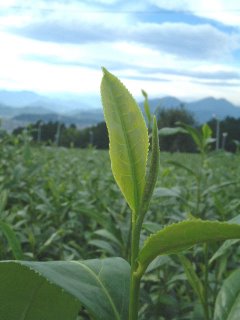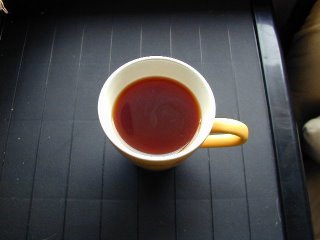A Bit O' History and Some Facts
Continuing this week's focus on Black Tea, I'd like to talk a little about its roots, so to speak.In the Beginning
China is where the story of tea originates. Legend has it that an emperor, named Shen Nung, was boiling some water as a health precaution, which he himself enforced. This boiling water was next to a tea tree and some leaves fell into the pot. When Nung drank this leafy water he felt refreshed and revitalized. The discovery prompted the emperor to encourage tea drinking for its healing properties and from there it expanded into a whole industry.
The exact truth of how tea came to be discovered is not known; however, because of the practical nature of the legend, historians believe this to be a very likely factualism.
Enter Black Tea
Not long after the discovery of tea was made, the Chinese discovered that if they dried the leaves and broke them apart they could create different flavors. This is how the refinement
processes started to crop up, and it is from this that we get black tea.
processes started to crop up, and it is from this that we get black tea.
Image courtasy of Unversity of Shizuoka
Camellia Sinensis is the scientific name of the plant we know as the tea shrub or tea tree. This is important to understand because in order to call a flavor "true tea" it absolutely must come from this plant. Other "untrue teas" that don't include Camellia Sinensis are usually known as herbal tea. This type of tea has been around just as long if not longer than regular tea, but the difference is that these drinks are infused with a variety of different plants used in conjunction as a medicinal remedy.
Refinement
Camellia Sinensis is refined to make 4 different categories of tea:
- Green - barely oxidized
- Black - completely oxidized
- Oolong - partially oxidized
- White - non-oxidized leaf tips
The process of oxidization is oxygen reacting to the chemicals of the tea leaves. This begins after the leaves have been picked and withered, and is stopped when they fire the leaves - similar to pottery firing. This process is also known as fermentation, but that term is disliked in the tea industry because it connotates the production of fruit to alcohol, as with wine. Oxidize is the more proper term.
Best Black Tea Regions
Some the best black teas grown in the world come from India and Sri Lanka. China grows many black teas too, but few are near to the quality that India and Sri Lanka produce.
Below are the four best, and most popular black teas sorted by country and named for the region they grow in.
China
- Keemun
- Assum
- Darjeeling
- Ceylon
The American Experience
90% of all tea consumed in the world comes in the black tea variety. Needless to say America has kept up with that percentage with Lipton being the biggest producer of black tea in the world. If you have drank tea in the States, chances are that you've had black tea.
At the moment, the US is a proud coffee drinking country, which wasn't always the case. So in the shortest possible space I'm going to try and explain how this happened.
England colonized this country, they liked tea and so did the colonists. England made the colonies angry and we had our last Boston Tea Party. We fought each other, we won, we decided to be different in every possible way. Cars drive on the right side, and we drink coffee.
It's truly sad that we had to protest everything right down to the tea. Especially since black tea is similar to coffee and frankly, a whole lot better. I'm glad to see America is finally coming around to enjoying tea again, as well as discovering its healthy properties. So if you're just discovering tea for the first time, or maybe rediscovering it, what not a better way then to start with the classic black teas.
Some information was gathered from:
About.com
Wikipedia.org
Moorecoffee.com
Celestialseasonings.com





0 comment(s):
Post a comment
<< Home